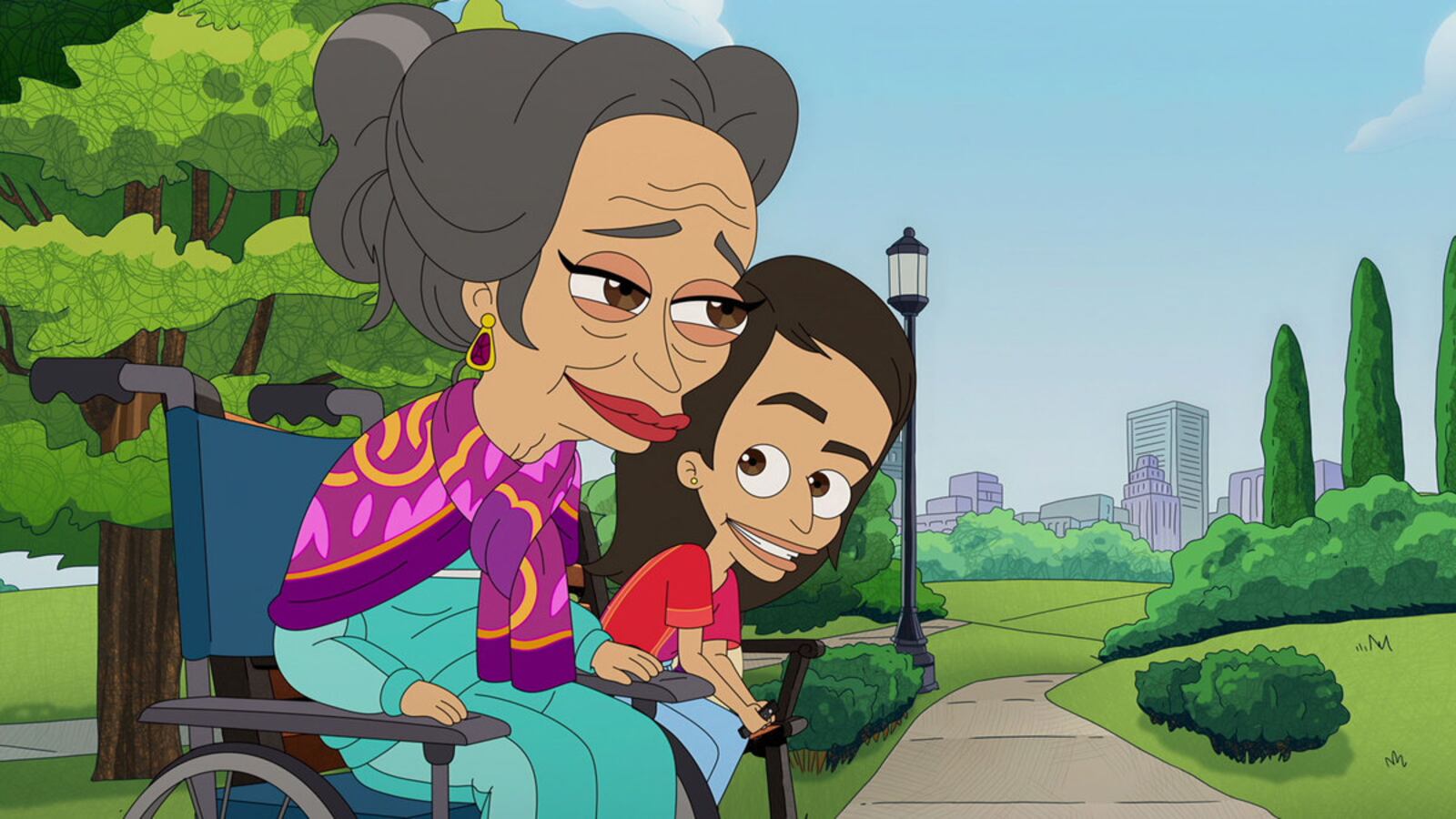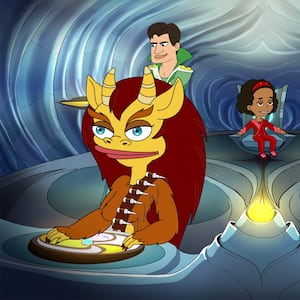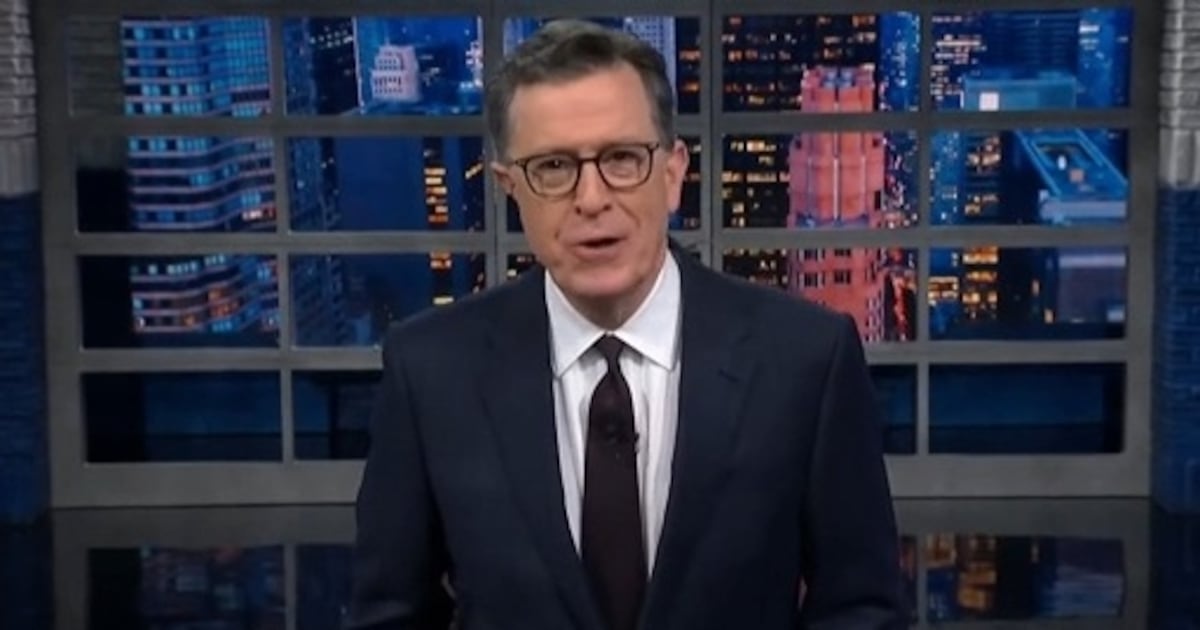Over the span of five seasons, the world of Netflix’s adult animated series Big Mouth has introduced viewers to many monsters based on human emotions, including horniness, shame, anxiety, depression, and love. Now the workplace spin-off series Human Resources, which launched last week, continues to expand its universe with more emotional monsters guiding humans through their everyday lives. But one monster introduced in the penultimate episode of the freshman season caught me off guard, representing something that hit way too close to home.
Created by the same team at Big Mouth—Nick Kroll, Andrew Goldberg, Mark Levin, Jennifer Flackett, and Kelly Galuska—Human Resources centers around a human relations workplace for monsters who are assigned to help humans cope with their daily tornado of feelings.
Because Human Resources deals with the adults instead of pubescent seventh-graders, the writers can tell bolder, more humanistic stories, all while inventing more cartoon creatures to help characters grapple with emotions that Big Mouth’s kids wouldn’t fully comprehend the weight of just yet, such as grief.
Relatively early in the season in the episode “Training Day,” Walter the Lovebug (Brandon Kyle Goodman) takes his bumbling novice co-worker Emmy (Aidy Bryant) out on a, well, training day as a means to help improve her performance at her job. He introduces her to Yara (Nidah Barber-Raymond), an elder Lebanese woman with Alzheimer’s, whom he describes as his favorite client.
Whenever Walter arrives, Yara goes into her memory bank and fondly reminisces about spending time with the love of her life, Safi, during the peak of her youth. All of this is usually interrupted by the arrival of her son Amir (Ahmed Mawas), who visits her at the retirement home. Though it’s a C-plot that is given little screen time, the depiction of the familial love the son has towards his mother despite her health is surprisingly heartwarming.
The way this kind of reality is depicted in a show that, when you get down to it, is mostly focused on being horny and raunchy on main, strikes a cord. That said cord turns into an electrical fire of the heart when Amir and Yara return in the penultimate episode of the season with a more prominent presence and a more poignant story.
In the ninth episode of the season,“It’s Almost Over”, everyone in Yara’s sphere, family and monsters alike, have to come to grips with her inevitable passing. After Yara breaks her hip at the old folks home, Amir takes on the responsibility of being his mother’s caregiver and brings her home to live with his family.
Logic Rock Pete (Randall Park) arrives to aid Amir in making concrete decisions about his mother’s care, while Walter helps Yara navigate her day. Walter is informed by one of his coworkers, Anxiety Mosquito (Maria Bamford), that Yara’s time on Earth is about to end. Around the same time, Pete and Amir are visited by a wooly cashmere sweater monster with crow legs named Keith from Grief (Henry Winkler), who tries to prepare them for the reality of Yara’s upcoming passing. As Walter tries his best to keep Yara and her memories active as she spends the day with her granddaughter Natalie (Josie Totah), Pete and Amir attempt to evade an ever-transforming Keith.
“It’s Almost Over” wears grief on its sleeve through the duality explored in the perspectives of Amir/Pete and Yara/Walter. Both parties attempt to run from the truth that Yara’s time is nearly coming to an end. How it’s depicted is a major divergence from the normal tone of the series. The more the episode progresses, the more stressful the weight of the looming tragedy becomes. Yara’s memory begins to distort, and a panicked Walter is unable to maintain control. The same panic applies to Pete and Amir, who are trying to find Yara while being chased by the monstrous Keith. The in-your-face metaphor of running from grief only makes the emotions stronger.
For a series full of unapologetic crass humor, Human Resources depicts this heavy topic with a balanced sense of creativity and nuance, which can be attributed to writer Victor Quinaz. Both “Training Day” and “It’s Almost Over” are penned by Quinaz, and the way he introduces these characters to viewers is distinctly more intimate than anything else the Big Mouth universe has offered to date.
Though Yara’s family don’t have as much screen time as the other adult groups the monsters have to assist in the season, the way Quinaz illustrates their functionality and togetherness in a loving manner quickly pierces the soul. It triggered my own fresh grief, which I’m still working through as I write this article.
Earlier this month, I had to say goodbye to my dad, Rendy Jones Sr., who passed away just a couple of days before my birthday. Much like Yara, he was the parent of three kids and loved us endlessly with his entire heart. It wasn’t something I was prepared for, nor did I want to accept what was happening. It was my first time dealing with this level of grief. I’ve seen many movies and television shows that tackle the subject, but I could never fully grasp or comprehend it—I was too unfamiliar with the notion. So after my dad’s passing, I bobbed and weaved, dodging just about anything that even remotely touched upon the subject or dealt with any sort of heavy-handed issues.
I genuinely expected Human Resources to be a light offering that might help distract from my own grief, but “It’s Almost Over” saw right through me and tackled my soul head on.
Ever since my sisters and I left the hospital where we had to say goodbye, I haven’t had the ability to cry. I traveled between feeling numbness and sadness. But as the episode was nearing its conclusion, with all the loving members of Yara’s family coming together to say their goodbyes and cry around her deathbed, I was taken back to seeing my old man on his.
It was a visceral reaction that came flooding back, and, for the first time since his passing, I broke down and sobbed. In the moment, I realized that I was evading my own grief by seeking out any distractions I could in order to evade the notion of crying. The painfully resonant episode was a reminder that the only way out is through.
It’s surreal that the first piece of media to make me come to grips with my own grief was an episode of a Big Mouth spin-off, but it’s as Walter the Lovebug says in the final minutes: “Life is so cruel and unfair, and yet so fucking precious.”









